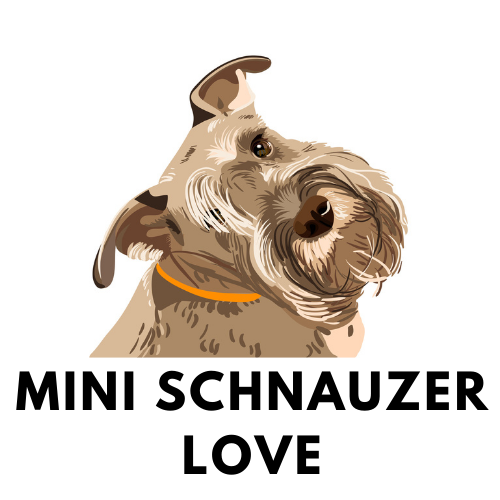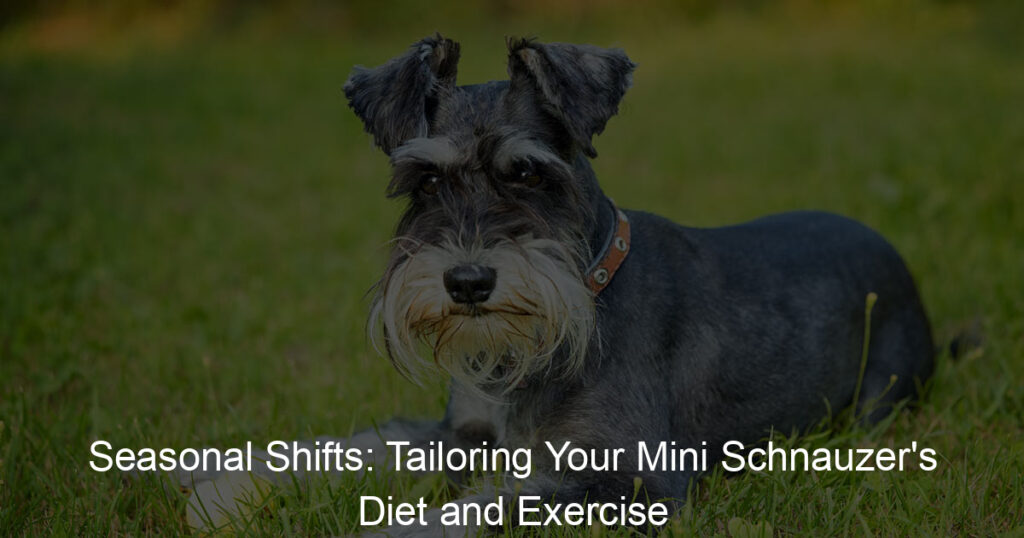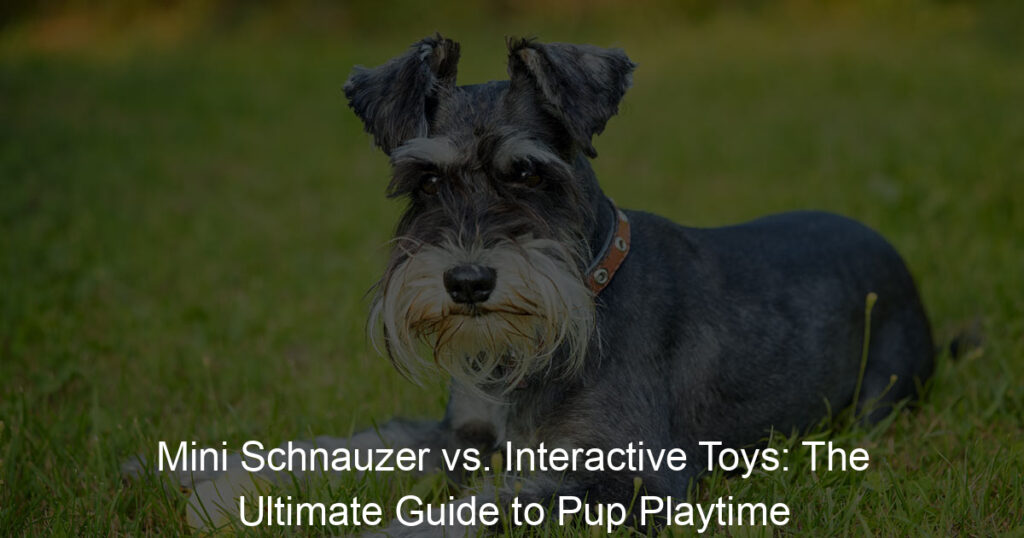
Introduction to Seasonal Shifts in Mini Schnauzer Care
As a Mini Schnauzer owner, it’s essential to understand that your furry friend’s needs can change with the seasons. Just like humans, dogs also need to adapt to the changing weather conditions. This blog post will guide you on how to adjust your Mini Schnauzer’s care routine according to the seasons, ensuring they stay happy and healthy all year round.
- Importance of Adapting Dog Care with Changing Seasons
- Specific Needs of Mini Schnauzers
Adapting your dog’s care routine to the changing seasons is crucial for their health and well-being. For instance, during the hot summer months, your Mini Schnauzer may require more water to stay hydrated, while in the colder months, they might need extra warmth to stay comfortable. By understanding the seasonal shifts, you can provide the best possible care for your Mini Schnauzer, helping them to thrive in any weather condition.
Mini Schnauzers, like all breeds, have their unique needs. These small, energetic dogs have a double coat that requires regular grooming, especially during the shedding seasons of spring and fall. They also have a high energy level, so they need plenty of exercises, regardless of the season. Additionally, Mini Schnauzers can be sensitive to extreme temperatures, so it’s important to adjust their diet and exercise routine accordingly. For example, during hot summer days, try to walk your Mini Schnauzer early in the morning or late in the evening when the temperatures are cooler.
In the following sections, we will delve deeper into the specific dietary needs and exercise routines for Mini Schnauzers, as well as additional seasonal care tips to ensure your Mini Schnauzer stays healthy and happy throughout the year.
Understanding the Mini Schnauzer Diet
Feeding your Mini Schnauzer a balanced and nutritious diet is crucial for their health and well-being. In this section, we will delve into the basics of a Mini Schnauzer diet, discussing what a typical diet looks like and the specific nutritional needs of this breed.
Basics of a Mini Schnauzer Diet
Understanding the basics of a Mini Schnauzer diet can help you make informed decisions about what to feed your pet. Let’s explore the typical diet and nutritional needs of a Mini Schnauzer.
- Typical Diet for a Mini Schnauzer
- Nutritional Needs of a Mini Schnauzer
A Mini Schnauzer’s diet should be rich in high-quality proteins, healthy fats, and a moderate amount of carbohydrates. Proteins are essential for muscle development, while fats provide energy and support skin and coat health. Carbohydrates offer the necessary energy for their active lifestyle. A typical meal might include lean meats like chicken or fish, whole grains like brown rice or oats, and a variety of fruits and vegetables for added vitamins and minerals.
Mini Schnauzers require a balanced diet to support their high energy levels and prevent health issues. They need a good balance of protein (around 18-25%), fat (around 10-15%), and carbohydrates. Additionally, they require certain vitamins and minerals, such as Vitamin A for eye health, Calcium for bone strength, and Omega-3 fatty acids for a shiny coat and healthy skin.
Remember, each Mini Schnauzer is unique, and their dietary needs may vary based on their age, weight, activity level, and health status. Always consult with your vet to determine the best diet for your Mini Schnauzer.
Adapting the Mini Schnauzer Diet with Changing Seasons
Just like humans, the dietary needs of Mini Schnauzers can change with the seasons. It’s important to adapt their diet to ensure they are getting the right nutrients at the right time of year.
- Summer Diet Changes for Mini Schnauzer
- Winter Diet Changes for Mini Schnauzer
- Spring and Autumn Diet Changes for Mini Schnauzer
During the summer months, Mini Schnauzers are more active and may require more calories. However, it’s important to balance this with maintaining a healthy weight. Consider adding more lean protein to their diet, such as chicken or fish, to support their increased activity level. Also, make sure they have plenty of fresh water to stay hydrated in the heat.
In winter, Mini Schnauzers may be less active and require fewer calories. However, they still need a balanced diet to support their overall health. Consider reducing the amount of high-calorie foods in their diet and increasing their intake of fruits and vegetables. These provide essential vitamins and minerals that can help boost their immune system during the colder months.
In spring and autumn, Mini Schnauzers’ dietary needs may vary based on their activity level and any health issues they may have. It’s a good idea to monitor their weight and adjust their diet as needed. For example, if they are gaining weight, you might need to reduce their calorie intake. If they are losing weight, they may need more calories.
Remember, every Mini Schnauzer is unique and their dietary needs can vary. Always consult with your vet before making significant changes to your pet’s diet.
| Season | Dietary Changes |
|---|---|
| Summer | Increase lean protein, ensure plenty of fresh water |
| Winter | Reduce high-calorie foods, increase fruits and vegetables |
| Spring/Autumn | Monitor weight, adjust calorie intake as needed |
Exercise for Mini Schnauzers
Keeping your Mini Schnauzer active is essential for their health and happiness. A well-exercised dog is a happy dog, and this is particularly true for Mini Schnauzers. Let’s explore the typical exercise routine for these energetic little dogs.
Typical Mini Schnauzer Exercise Routine
Mini Schnauzers are known for their high energy levels and need a good amount of exercise each day. Here are some guidelines for their daily exercise routine and the types of exercises that are suitable for them.
- Recommended daily exercise for Mini Schnauzers: Mini Schnauzers should ideally get at least 60 minutes of exercise per day. This can be split into two or three walks, along with some playtime. Remember, a tired Mini Schnauzer is a well-behaved Mini Schnauzer!
- Types of exercise suitable for Mini Schnauzers: Mini Schnauzers love to play, so games like fetch and tug-of-war are great options. They also enjoy agility activities, which not only provide physical exercise but also mental stimulation. Regular walks or jogs are also beneficial, as they help to burn off energy and keep your Mini Schnauzer’s weight in check.
Remember, each Mini Schnauzer is unique and may have different exercise needs. Always monitor your dog during exercise to ensure they are not overexerting themselves. Regular vet check-ups can also help you tailor an exercise routine that is best suited to your Mini Schnauzer’s needs.
Adapting Exercise for Mini Schnauzers in Different Seasons
Just like humans, Mini Schnauzers also need to adapt their exercise routines according to the changing seasons. Let’s explore how you can modify your Mini Schnauzer’s exercise routine in different seasons to ensure their optimal health and happiness.
- Summer Exercise Adaptations for Mini Schnauzers
In the summer, the heat can be overwhelming for Mini Schnauzers. It’s essential to adjust their exercise routine to prevent overheating. Try to walk your Mini Schnauzer early in the morning or late in the evening when the temperatures are cooler. Always carry water for both you and your pet. Remember, if it’s too hot for you, it’s too hot for them.
- Winter Exercise Adaptations for Mini Schnauzers
Winter can be a challenging season for Mini Schnauzers due to the cold weather. However, they still need their daily exercise. Consider shorter, more frequent walks. Always check their paws for ice or salt, which can be harmful. If it’s too cold outside, indoor games can be a great alternative to keep them active.
- Spring and Autumn Exercise Adaptations for Mini Schnauzers
Spring and Autumn offer the most comfortable temperatures for outdoor activities with your Mini Schnauzer. These seasons are perfect for longer walks or hikes. However, be aware of seasonal allergies, and always check for ticks after outdoor activities. Remember, a healthy dog is a happy dog!
| Season | Exercise Adaptation |
|---|---|
| Summer | Early morning or late evening walks, carry water |
| Winter | Shorter, more frequent walks, indoor games |
| Spring/Autumn | Longer walks or hikes, check for ticks |
In conclusion, adapting your Mini Schnauzer’s exercise routine according to the season is crucial for their health and well-being. Always remember to monitor the weather conditions and adjust accordingly. Your Mini Schnauzer will thank you!
Seasonal Dog Care Beyond Diet and Exercise
While diet and exercise are crucial elements in caring for your Mini Schnauzer, it’s also essential to consider their grooming needs, which can change with the seasons. Let’s explore the grooming needs of Mini Schnauzers in different seasons.
Grooming Needs of Mini Schnauzers in Different Seasons
Mini Schnauzers, known for their distinctive beards and eyebrows, have a double coat that requires special attention. The grooming needs of these adorable dogs vary depending on the season.
- Summer grooming needs
- Winter grooming needs
During the summer, Mini Schnauzers can get quite hot due to their dense undercoat. Regular brushing is essential to remove loose hair and prevent matting. It’s also a good idea to trim their hair short to keep them cool. But remember, never shave your Schnauzer’s coat completely as it protects them from sunburn.
In winter, your Mini Schnauzer’s coat will naturally thicken to provide warmth. It’s important to keep their coat longer during this time. However, regular brushing is still necessary to prevent tangles and matting. Pay special attention to their paws, as snow and ice can get stuck between their toes, causing discomfort or even frostbite.
Understanding your Mini Schnauzer’s grooming needs in different seasons will help keep them comfortable and healthy all year round. Remember, grooming is not just about maintaining their appearance but also about ensuring their well-being.
Health Check-ups and Vaccinations
When it comes to the health of your Mini Schnauzer, there are two key areas to focus on: regular health check-ups and vaccinations. Let’s dive into why these are so important.
- Importance of Regular Health Check-ups
Regular health check-ups are like a report card for your Mini Schnauzer’s health. They allow your vet to catch any potential health issues early, before they become serious problems. These check-ups typically include a physical examination, blood tests, and sometimes even dental checks. Regular check-ups are especially important for Mini Schnauzers, as they can be prone to certain health issues such as eye problems and skin conditions.
According to a study, regular health check-ups can increase the lifespan of your pet by up to 20%. That’s like adding several more years of playtime, walks, and cuddles with your furry friend!
- Vaccinations Needed for Mini Schnauzers
Just like kids, Mini Schnauzers also need their shots. Vaccinations protect your pet from a variety of serious, and sometimes deadly, diseases. Some of the key vaccinations for Mini Schnauzers include:
| Vaccination | Protection Against |
|---|---|
| Rabies | A deadly disease that affects the nervous system |
| Distemper | A serious viral illness with no known cure |
| Parvovirus | A highly contagious virus that can cause severe gastrointestinal issues |
| Bordetella | Also known as kennel cough, a common cause of respiratory disease in dogs |
Remember, the best way to keep your Mini Schnauzer healthy and happy is through regular health check-ups and timely vaccinations. After all, a healthy dog is a happy dog!
Conclusion: The Importance of Seasonal Care for Mini Schnauzers
As we wrap up our discussion, it’s crucial to underscore the importance of seasonal care for Mini Schnauzers. The changing seasons bring about shifts in the dietary needs and exercise routines of these small, energetic dogs. By understanding and adapting to these changes, you can ensure your Mini Schnauzer stays healthy and happy all year round.
- Recap of the importance of diet and exercise adaptations
Throughout the year, your Mini Schnauzer’s dietary needs will change. In colder months, they may require more calories to stay warm, while in warmer months, they may need less. Similarly, their exercise routines may need to be adjusted. In the summer, for instance, it’s best to avoid the hottest parts of the day to prevent overheating. Remember, a well-balanced diet and regular exercise are key to your Mini Schnauzer’s health and well-being.
- Final thoughts on seasonal dog care
Seasonal care for your Mini Schnauzer goes beyond just diet and exercise. It also involves grooming changes, like more frequent brushing during shedding seasons, and health checks, such as ensuring they’re protected from seasonal pests like ticks and fleas. By being attentive to these seasonal shifts, you can provide the best care for your Mini Schnauzer, ensuring they remain a vibrant and loving part of your family.
In conclusion, understanding and adapting to the seasonal needs of your Mini Schnauzer is an essential part of responsible pet ownership. It ensures your furry friend stays healthy, happy, and active, no matter the season. Remember, every season brings its own set of challenges and opportunities, so stay informed and be ready to adapt. Your Mini Schnauzer will thank you for it!














